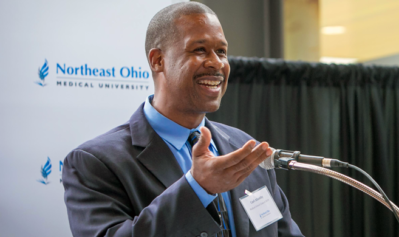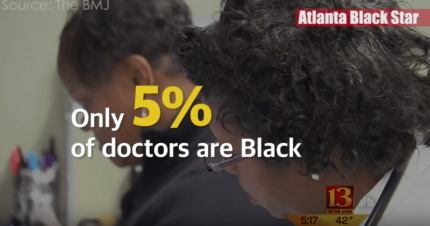Had it not been for his quick thinking, a Black doctor says his patient would’ve gone home with zero understanding of what was to come after receiving a life-changing diagnosis.
In a series of tweets, user @Oga_DoctorBlue highlighted the need for more Black men in the medical field, as they can relate to Black patients in ways white doctors cannot. That was the case during a visit from a patient who came in complaining of muscle weakness.

The doctor said he had to “code switch” in order for the patient to understand what exactly was going on with him. (Image courtesy of Getty Images)
“I had a patient this week who came in with left leg weakness over the last week,” he said of the man, who he described as a younger Black guy in his 30s. ” …The Brain MRI clearly indicates multiple sclerosis. So, we (the staff) all go in during morning rounds to give my man his diagnosis.”
“He has a bit of blank stare as he listens to my attending try to explain what he has,” he added. “He was told earlier he might’ve had a stroke, and now we’re telling him he doesn’t have a stroke, but he’s clearly processing what he does have and just says ‘nah’ to having any questions.”
@Oga_DoctorBlue, the sole Black doctor on staff, recalled his colleagues laughing at the man’s “apathetic” response to his diagnosis, saying it seemed as if he just “didn’t care.” What fellow medics saw as an indifferent reaction, however, @Oga_DoctorBlue saw as a golden opportunity to help the patient understand what was going on, Black man to Black man.
After finishing his rounds, the doctor said he headed straight back to the patient’s room and automatically “code switched.”
“‘Look mane, I know all that was a lot,” he recalled telling the patient. “‘Did you really get what the doc was sayin?’ Mans looked at me with a face of relief.”
“Now I’m going into detail on MS, how it’s different from a stroke, and what it means for him long term,” he explained. “The real validation came when he interrupted me early on and said ‘OH, so it’s a BRAIN thing I got?’ Yes my man it’s a brain thing.”
After a discussion on necessary lab tests and what the rest of his life might look like after his diagnosis, the patient seemed to be all caught up.
” … All because I could recognize what everyone else seemed to miss, from a cultural perspective,” @Oga_DoctorBlue wrote. “He’s not apathetic. Folk just weren’t connecting with him.”
The doctor said the next day, he noticed the patient was much more interactive with the staff and asked more questions, to which doctors gave great answers.
“The diagnosis was tough, but his story ends well,” he said.


